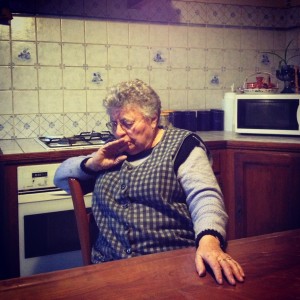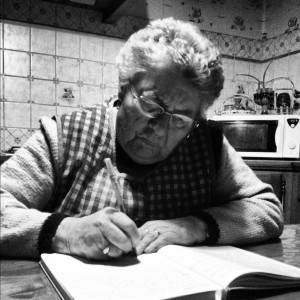Upon meeting Madame Redon, the mother of the farmer we met in Moissac, we could tell that she was unlike the other interviewees whom we had a privilege to meet. During our first encounter, she would quip between the snippets of information we got from her son, Bernard. She always seemed to have an opinion or silly little tidbit to add to anything he said, showing her attentive nature to conversation and visitors to her home. When asked if she would mind doing a separate interview with Fallon, Amy and I, she was very excited but also very concerned that her hair would not have been done before she would be able to do the interview — a clear indication of the amount of spunk this woman had. Little did we know how interesting our dialogue would be as we spoke to her about various topics such as motherhood and her workmanship as a rural woman.
Sitting down with Irene, as she affectionately insisted we call her when we began the interview, was an experience. She would talk and answer our questions, paying special attention to her feelings and opinions, and then would work off tangent by prompting a conversation about a picture that she spotted on her walls. At one point in the interview, she even gave us a complete tour of her home, pointing out the pictures of her extended family members with a sassy story of them for us to grasp an understanding that this woman was not only very intelligent and strong-willed, but also had a wicked sense of humor to back it all up.
One of the focuses of our interview was talking about the value of family and her role as a mother with the balance of being a worker on her farm. She began by talking about her early life saying that she had been born in 1931 and raised on a farm. From the time she was very young, had learned how to drive a tractor and began to run her own portion of the farm. Interestingly enough, she talked at length about her frustration about tractors and how she prefers to drive them over cars because she could use two feet to push the pedals, and how difficult that was to maneuver when she drove cars. At age 21 in 1952, she was married after having met her husband a few short months prior. She had a daughter and a son (Bernard, whom we met prior to the interview) between 1952 and 1961. When prompted about her newfound caretaker role as a mother during this time, she responded by adding onto the importance of family to help alleviate the stresses a new mother would face. For example, she said that during the time she was breast-feeding and nursing both of her children, she was still working in the fields of her farm. During the times where she would be in the field, her children would be in the house with her mother and then she would periodically check in to feed them, promptly leaving to get back to the fields on her motorcycle. With this, I asked her if she believed this helped to alleviate the stresses of marriage, which she responded with an excited head nod.
On the topic of marriage, Irene was clearly very much a fan of an equal and balanced marriage to her husband of 59 years. When discussing her husband, we could see how much she really cared for the man whom she had shared 2 children, a farm, and memories with for so long. Talking about his death on November 16th, 2011 prompted our discussion of her connection with immigration. This was because Momo, a Moroccan man whose family has worked for the Redons for years, helped when Irene’s husband was dying and on the afternoon that he passed away. For two generations, Irene’s family has hosted Momo’s Moroccan family — one where the men primarily come to France and work, while the women and the rest of the family stays in Morocco. Momo is a primary member of the family during the seasonal time he is at their farm. Unfortunately, he was not on the farm when we talked to Irene and Bernard but we were able to grasp and understanding by how much respect they have for Momo by the way Irene talked about her gratitude towards him. Not only does he work in the fields tirelessly during the hot summers, but he also helps to make sure Irene is happy and content in her home by checking in on her and keeping her company to combat the loneliness she sometimes feels especially after her husband’s death. Irene became especially emotional when talking about the way people receive Momo in their French society and her frustrations with how immigrants are perceived by people. One story that Irene told us about Momo put these ignorances into perspective: Irene had been chatting with her girlfriends about Momo and his closeness to the family, which was received with perplexed stares and complicated smiles. When Irene asked why her friends were looked so confused, her friends simply responded with one question: “Does he even use a fork?”
This story was saddening both to Irene but also to ourselves because of how positive we were that French society had been progressive about immigrants, particularly from Morocco and other parts of Africa. However, it was reassuring to see how much Irene really respected and loved Momo like one of her children. The way she talked about Momo with a twinkle in her eyes about how she adored him and how he had contributed during the hard time of losing her husband, whom she loved so dearly, was inspiring. All in all, Irene provided us with a good grasp of the hard exterior of French mothering (particularly with rural areas where working seems to drive families) as well as a bunch of laughs as she told silly stories about herself and her family. The interview was both lighthearted and emotional and certainly one of the most memorable meeting memories I will have of an individual for a long time.


